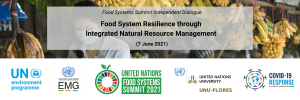Comentarios oficiales del Diálogo para la Cumbre de las Naciones Unidas sobre los Sistemas Alimentarios de 2021
Tipo de diálogo
Convocado por
Idioma del Diálogo
Fecha/hora
Para:
Enfoque geográfico
Formato
Por favor revise los detalles que encontrará más abajo para obtener información sobre cómo registrarse en el caso de que esté disponible o contacte al convocante si le gustaría asistir.
Administrador
Descripción
In 2021, UN Secretary-General António Guterres will convene a Food Systems Summit as part of the Decade of Action to achieve the Sustainable Development Goals (“SDGs”) by 2030 with the intention of inducing collaborative efforts to Build Back Better , and transform the way society produces, consumes, and considers food.
The Summit supports nutrient-rich Food Systems Dialogues, one of the five priority workstreams, which provides an opportunity to engage multi-level stakeholders (including governments, communities, academia, etc.) in discussing food systems and identifying ways to improve their resilience – especially against future pandemics and other crises.
Against this background, the UN Environment Management Group (“EMG”), in close collaboration with UNU Institute for Integrated Management of Material Fluxes and of Resources (“UNU-FLORES”) will organize a Food System Resilience through Integrated Natural Resource Management (7 June 2021) Nexus Dialogue as an independent dialogue of the Food System Summit, respecting the three key features: respectful of the Summit’s three principles of engagement; featuring structured conversations among stakeholder groups with different perspectives; and contribute to the Summit.
In recognizing that food systems are simultaneously the cause- and effect of layered variables and interactions, the Nexus Dialogue seeks to investigate the accelerating effect of Integrated Natural Resource Management (“INRM”), underlined by Donella Meadows’ systems-thinking framework for leverage points . A leverage point is a place in a system’s structure where a solution can be applied.
Arguably, INRM is a high impact leverage point which expedites the beneficial effect of resilient food systems on socioeconomic and environmental wellbeing. With the aim of detangling complexity, the Dialogue will focus on INRM’s impact, enhanced through Circular Bioeconomy (“CBE”) strategies , on reducing the risks of Poverty, Health, and Climate.
Homepage: https://unemg.org/food-system-resilience-nexus-dialogue/
Food System Resilience through Integrated Natural Resource Management
An Independent Dialogue of the Food Systems Summit
Convenor: Nina Arden, Sr. Nexus Dialogue Consultant, EMG Secretariat
Facilitator: Serena Caucci, Associate Programme Officer, UNU-FLORES
Notetakers: Zeynep Oezkul & Isabella Georgiou (UNU-FLORES)
Introduction & Welcome:
- Hossein Fadaei, Head of Office-Geneva, EMG Secretariat
- David M. Malone, Rector of the United Nations University, Under-Secretary-General of the United Nations
- Edeltraud Guenther, Director, UNU-FLORES
Curator & Key Remarks:
- Joseph Alcamo, Director of Sussex Sustainability Research Programme (SSRP)
Initial Expert Remarks
- Sasha Koo-Oshima, Deputy-Director, Land & Water Division, FAO
- Stefan Uhlenbrook, Strategic Program Director: Water, Food & Ecosystems, IWMI
- Johan Bouma, 2017 Alexander Von Humboldt Medal, Professor Emeritus, Wageningen University & Research (WUR)
- James Lomax, Food Systems and Agriculture Adviser, Ecosystems Division, UNEP, Secondee to the UN Food Systems Summit Secretariat
- Birguy Lamizana, Programme Officer, UNCCD-Bonn
Panel Questions
- Has your Agency experienced some success in adopting an Integrated Natural Resource Management approach in your programmes and mandates? What are some lessons you can share?
- What opportunities to transform food systems for the benefit of poverty eradication, health and climate risk mitigation have been created by leveraging an Integrated Natural Resource Management approach? What are the capacity gaps – i.e., what are we still missing?
- In pursuit of Building Back Better, what does an “enabling” environment look like to support Integrated Natural Resource Management and Circular Bioeconomy Strategies in policymaking for food systems?
For more information, please visit:
Registration: https://us02web.zoom.us/webinar/register/WN_BKLJMyfyRx2N-1aubTo2sg
Agradecimiento


